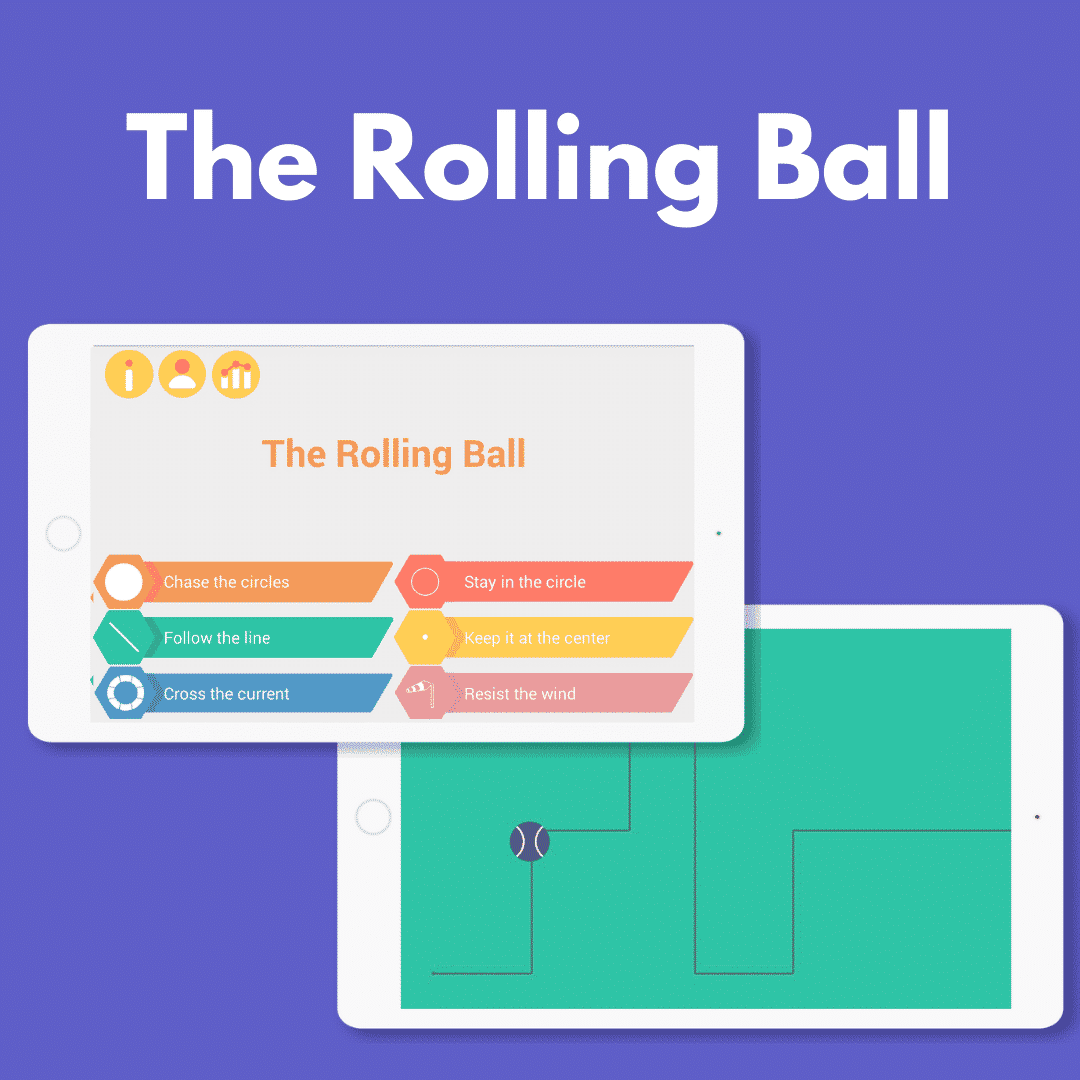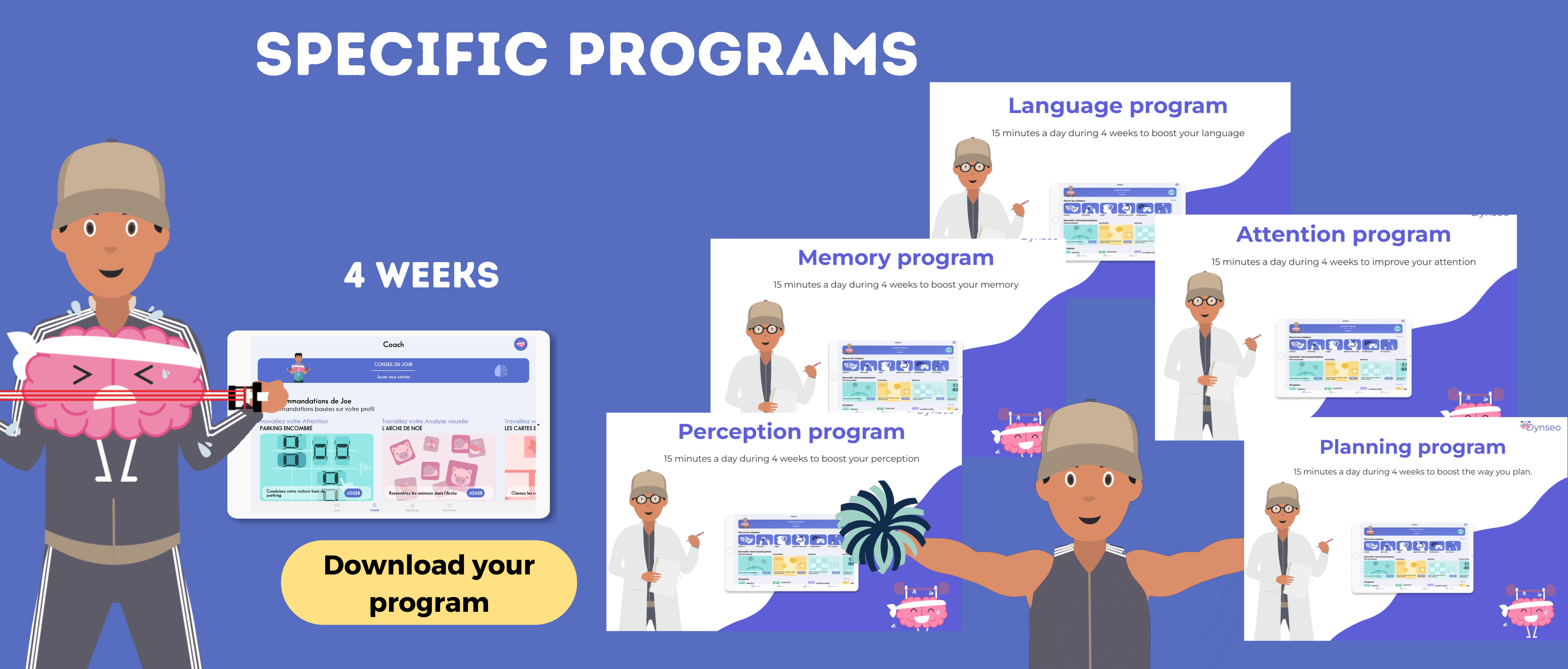Dynseo offers
MULTIPLE SCLEROSIS with THE ROLLING BALL, SCARLETT and CLINT
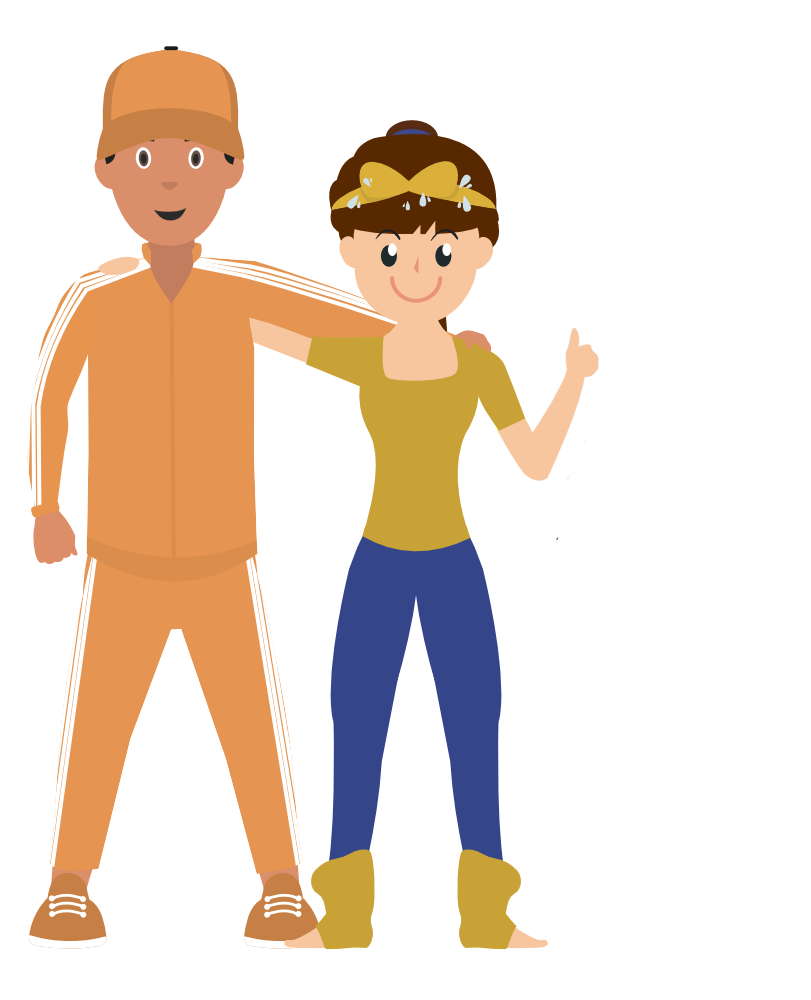
Multiple sclerosis (MS) is a chronic autoimmune disease affecting the central nervous system. It is characterized by inflammatory and demyelinating lesions that can cause a wide range of neurological symptoms, such as fatigue, muscle weakness, vision and balance disorders, as well as coordination and speech difficulties.
MS affects around 2.5 million people worldwide, with a predominance of women. Although its exact cause is unknown, genetic, environmental and immunological factors may contribute to the development of the disease. Unfortunately, there is currently no cure for MS, but treatments can help slow disease progression and relieve symptoms.
Motor disorders
Tireness
Muscle weakness
Balance problems
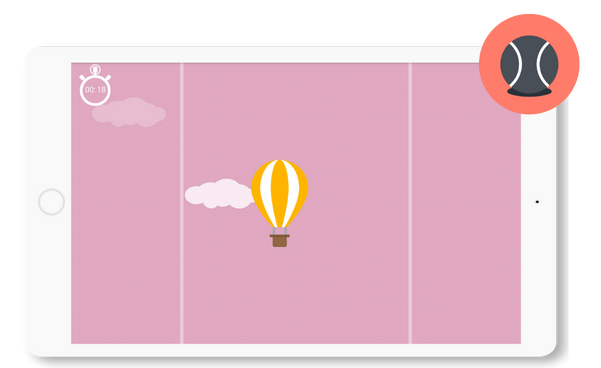
The rolling ball
Memory disorders
Memory lapses
Forgetting people’s names
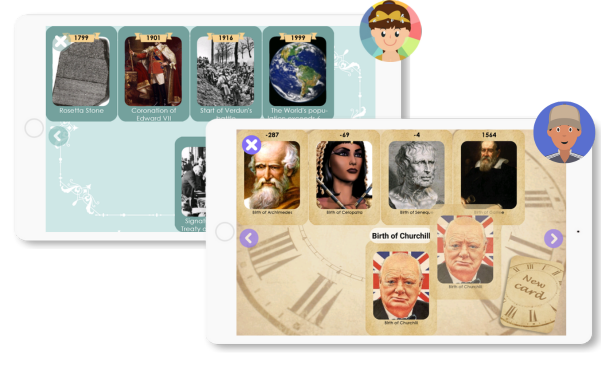
Clint and Scarlett
Attention disorders
Difficulty to focus
Difficulty switching between tasks
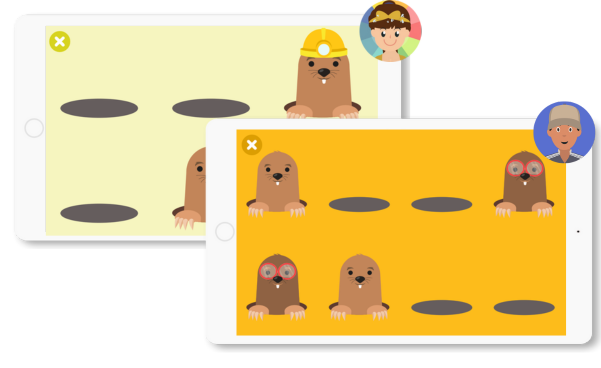
Clint and Scarlett
Language disorders
Non-fluent speech
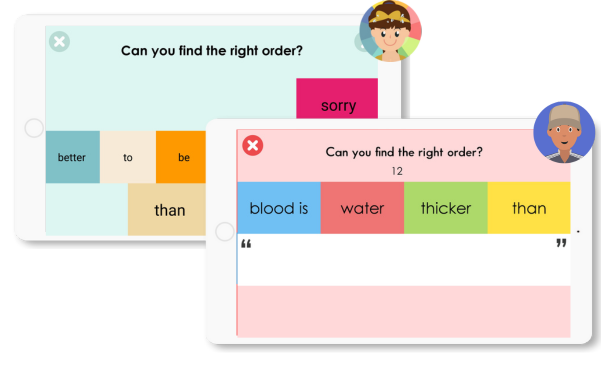
Clint and Scarlett
DYNSEO’S APPLICATIONS FOR MULTIPLE SCLEROSIS
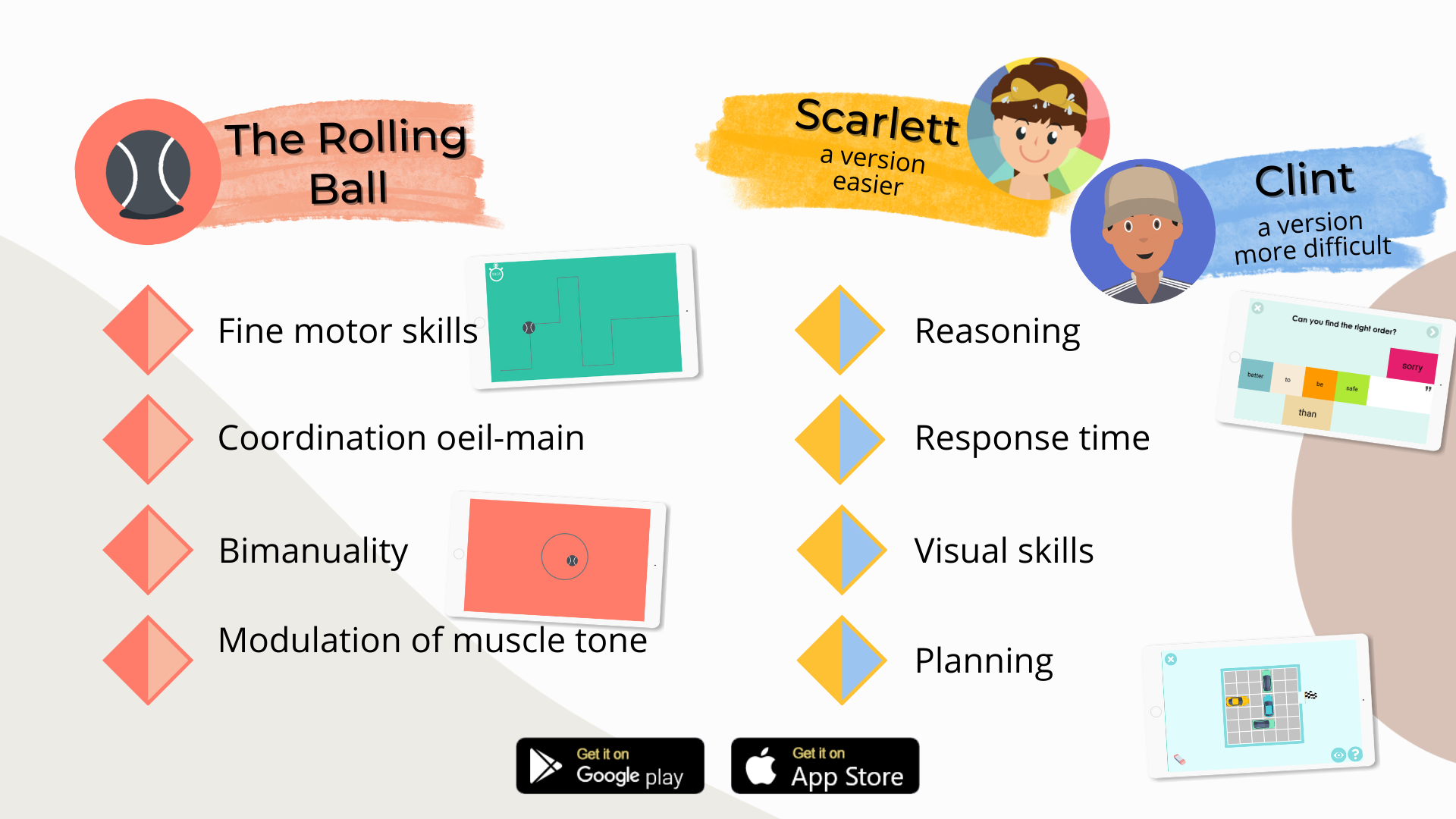
Scarlett (easier version) and Clint (harder version) offer a variety of over 30 memory games, specially designed to playfully stimulate all cognitive functions.
THIS GUIDE provides
01.
Motor skills games with The Rolling Ball
Discover games adapted for multiple sclerosis motor disorders, focusing on coordination and fine motor skills that encourage hand and arm movement.
03.
Attention games with Clint and Scarlett
Discover games that promote concentration and attention in people with multiple sclerosis, such as object-finding games and puzzle games to help improve focus.
02.
Memory games with Clint and Scarlett
Explore games designed to stimulate memory in people with multiple sclerosis, specifically designed for brain training and information retention.
04.
Language games with Clint and Scarlett
Explore language games to help overcome the language difficulties associated with multiple sclerosis.
I would like to receive the complete guide for people living with multiple sclerosis
with THE ROLLING BALL, CLINT AND SCARLETT
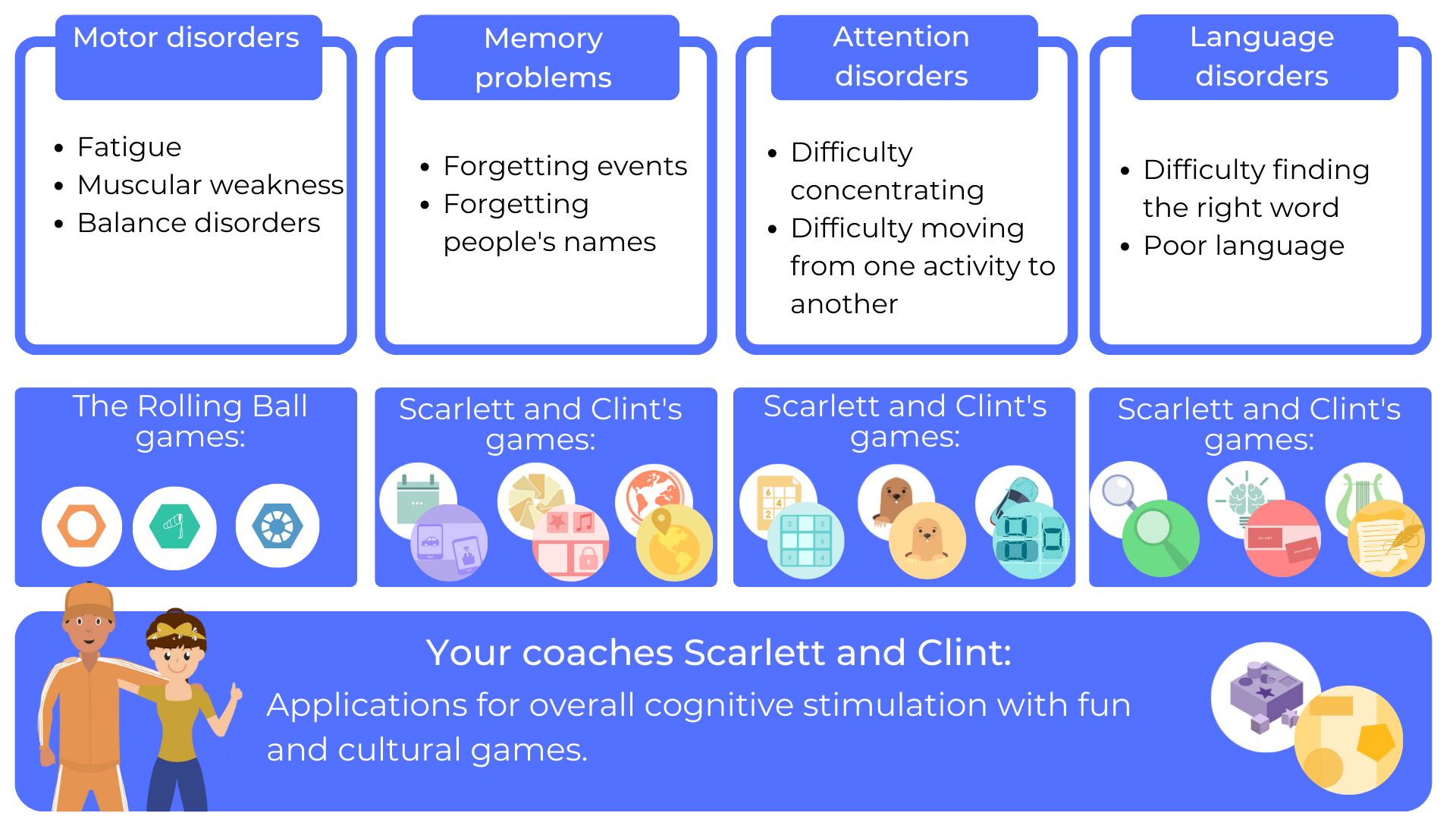
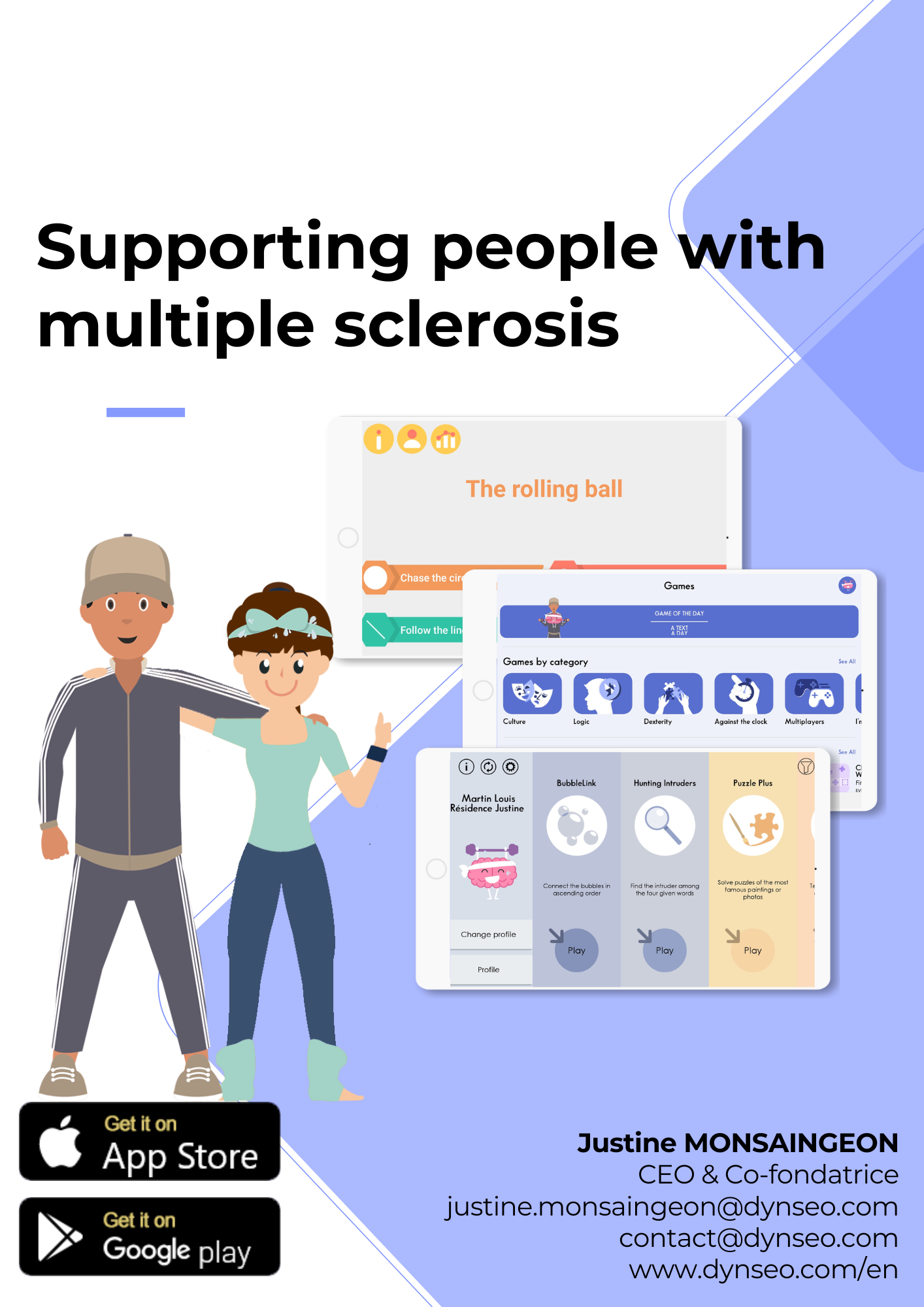
01.
MOTOR SKILLS GAMES WITH THE ROLLING BALL
Discover games adapted for the motor disorders associated with multiple sclerosis.

Resist the wind

Stay in the circle

Follow the line
Multiple sclerosis (MS) is a chronic autoimmune disease affecting the central nervous system. It is characterized by inflammatory and demyelinating lesions that can cause a wide range of neurological symptoms, such as fatigue, muscle weakness, vision and balance disorders, as well as coordination and speech difficulties. MS affects around 2.5 million people worldwide, with a predominance of women. Although its exact cause is unknown, genetic, environmental and immunological factors may contribute to the development of the disease. Unfortunately, there is currently no cure for MS, but treatments can help slow disease progression and relieve symptoms.
Motor disorders are often caused by lesions in the white matter of the brain and spinal cord, disrupting the transmission of nerve signals responsible for muscle control. Symptoms may vary from person to person, but frequently include muscle weakness, stiffness, tremors and muscle spasms. MS patients may also experience coordination and balance problems, which can lead to difficulty in walking and performing simple daily tasks. These motor disorders can have a significant impact on patients’ quality of life, affecting their mobility.
This fun, interactive approach offers an engaging way to improve these essential skills. In the context of multiple sclerosis, where movement management and coordination are often affected, regular fine motor training can make a significant contribution to maintaining physical functionality and improving quality of life.
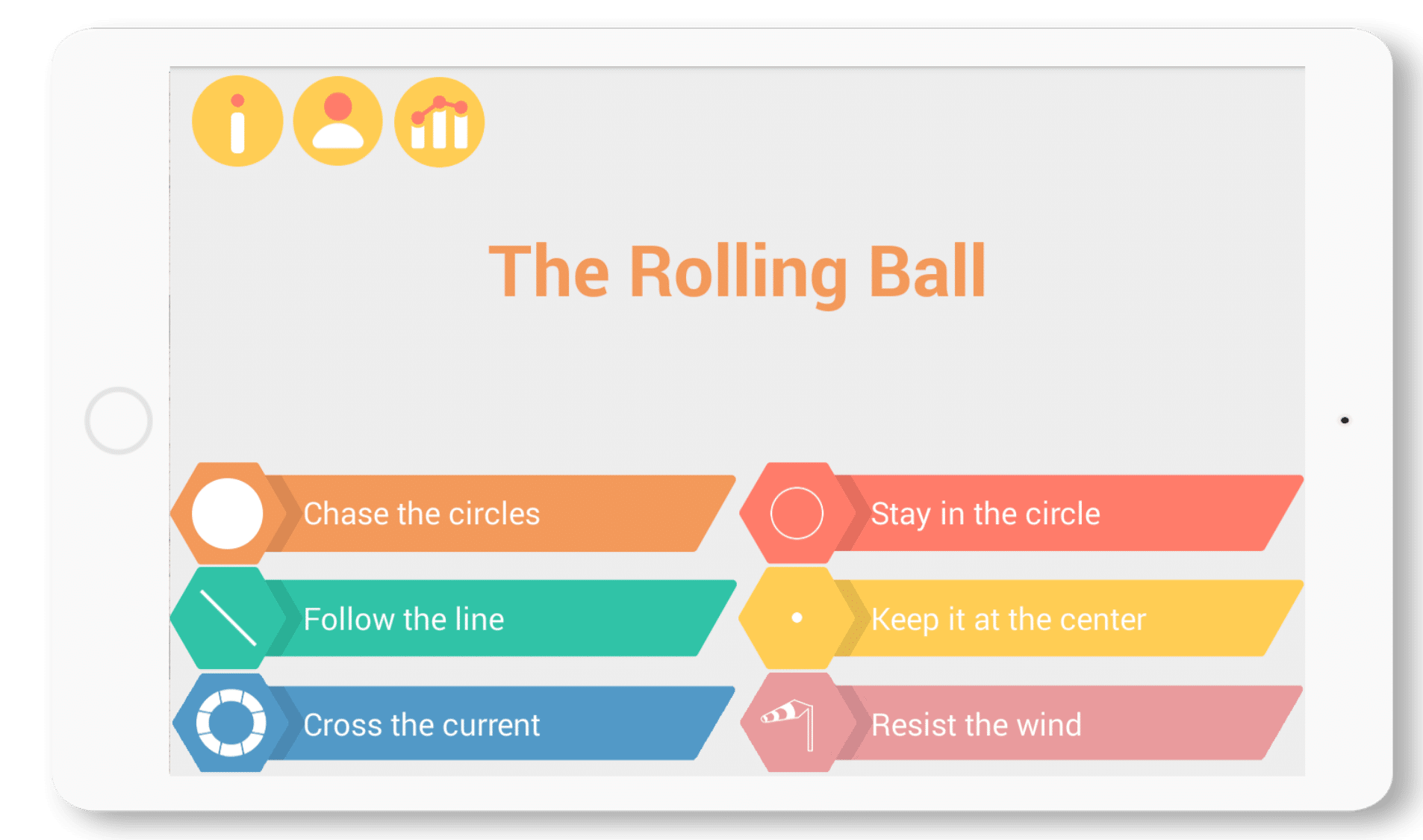
Resist the wind
Keep the ball in the middle of the screen, paying attention to the wind.
With this game, you can stimulate movement control in a variety of ways.
The wind can come from the left or the right: the player has to adapt the inclination of the tablet according to the direction of the wind, indicated by the white lines. The appearance of the wind is random, which means continuous movement adaptation.

Stay in the circle
Keep the ball in the center of the moving circle.
If the person makes involuntary movements, the marble will move out of the circle. He’ll need to be able to control these movements and look for strategies to quickly regain his balance. This type of stimulation is also effective if the person has tremors.
What’s more, the circle changes direction at random, so you’re also stimulating attention and reflexes.

Follow the line
Follow the line with the ball.
In this game, you can select straight lines (from left to right and vice versa, from top to bottom and vice versa, or diagonal lines) or a mixed course with all directions.
This game stimulates visual perception, as the player has to locate the entire course of the line and the position of the ball.
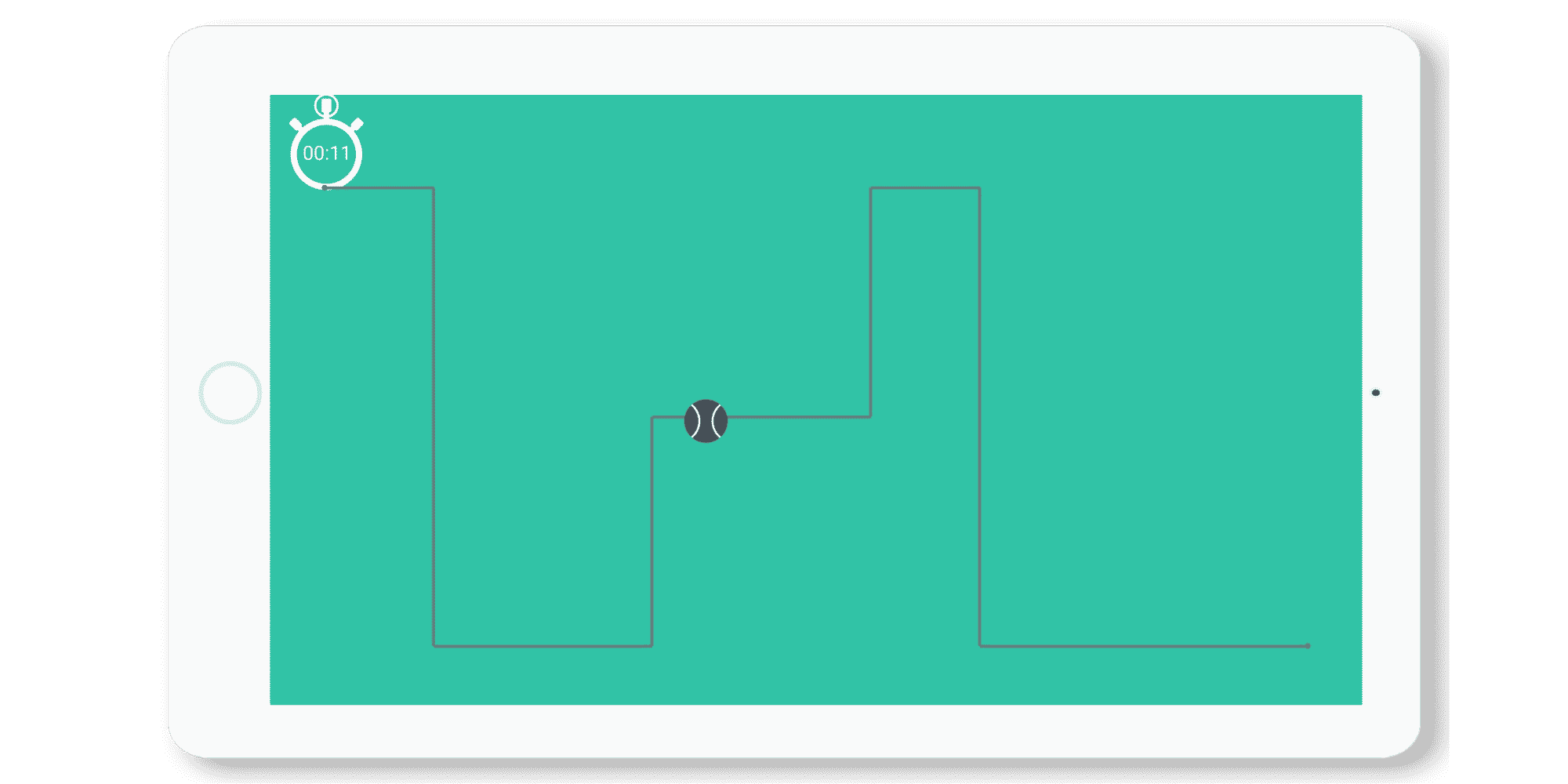
02.
MEMORY GAMES WITH SCARLETT AND CLINT
Explore games designed to stimulate memory in people with multiple sclerosis.
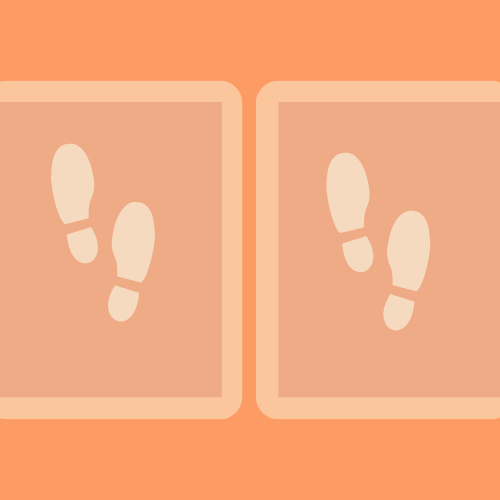
Twins

Furious cards

Geography
Cognitive disorders are also common in people with multiple sclerosis (MS). These disorders can affect memory, attention, concentration, information processing, problem-solving, planning and organization. People with MS may also experience difficulties with speech, language and executive functions. These disorders can have a significant impact on patients’ daily lives, including their ability to work, interact with others and maintain independence. Cognitive disorders can be difficult to diagnose and treat, but interventions such as cognitive rehabilitation, behavioral therapies and medication can be useful in helping patients manage these problems. It is important that MS patients are regularly assessed for cognitive impairment to enable early intervention and effective management of these symptoms.
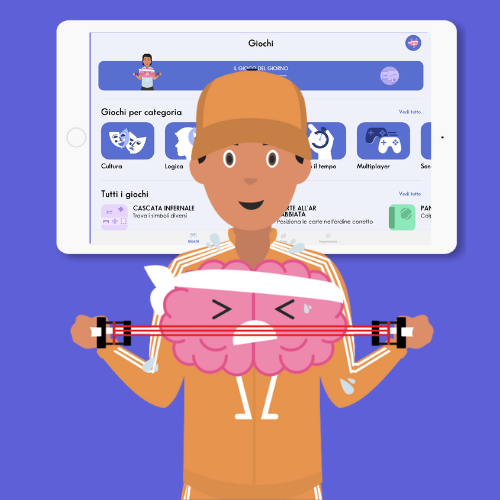
Clint, your brain coach
A more challenging version for dynamic cognitive enhancement
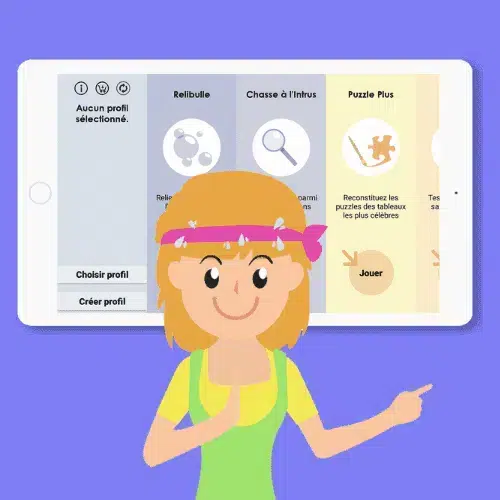
Scarlett, your memory coach
An easier version to train at your own pace and without checking.
The Memory
Memory problems are one of the most common cognitive disorders in people with multiple sclerosis (MS). MS patients may have difficulty recalling recent events or forget important information, such as people’s names, dates and important details of conversations. These memory disorders can have a significant impact on patients’ daily lives, particularly when it comes to managing complex tasks or planning activities. Treatments for MS memory disorders can include memory exercises, recall strategies and information management techniques to help patients better organize and remember important information.
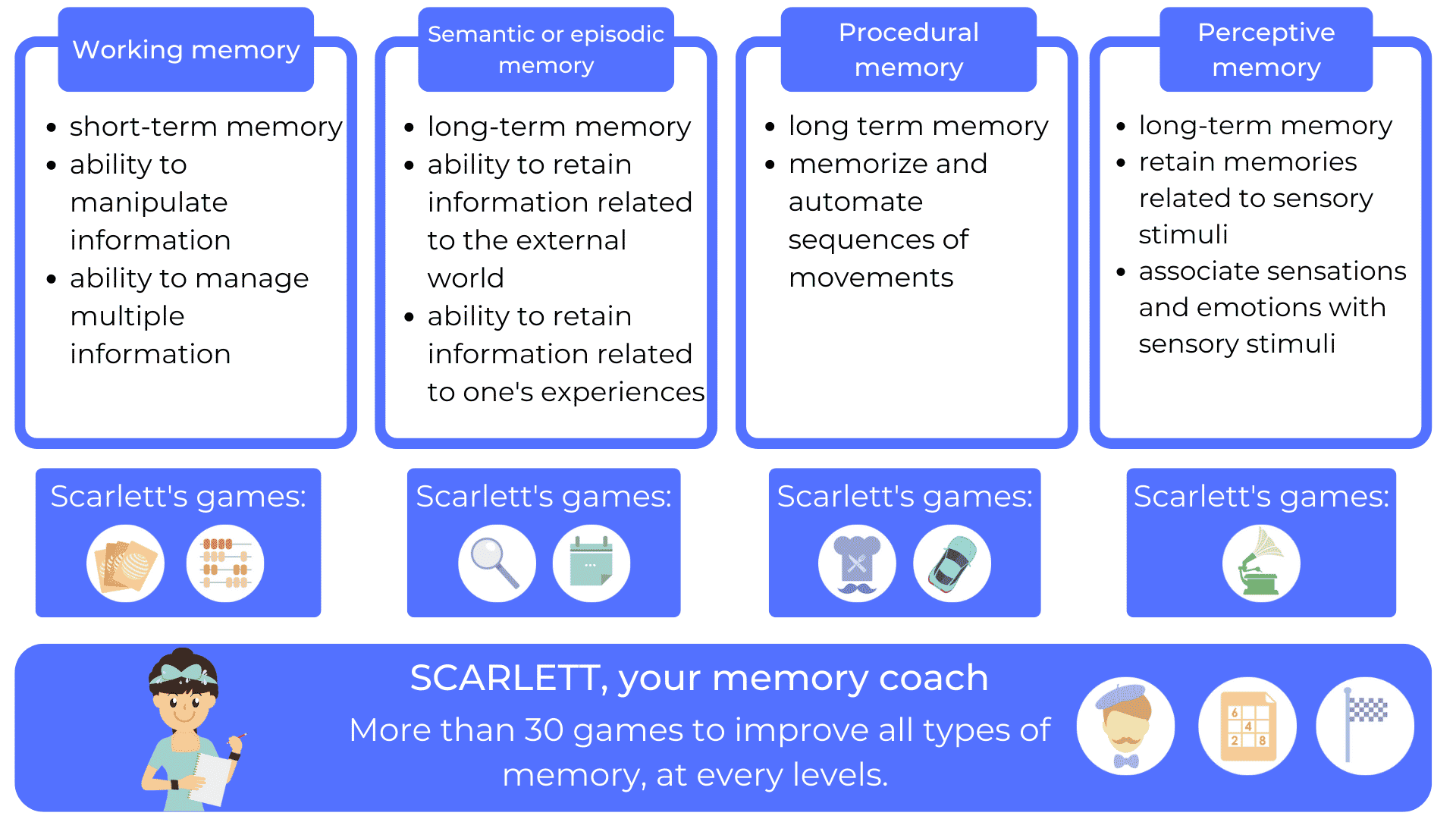
Twins
Find the pairs of images.
By associating identical images, players have to remember the location of each pair, which calls on short-term and visual memory.
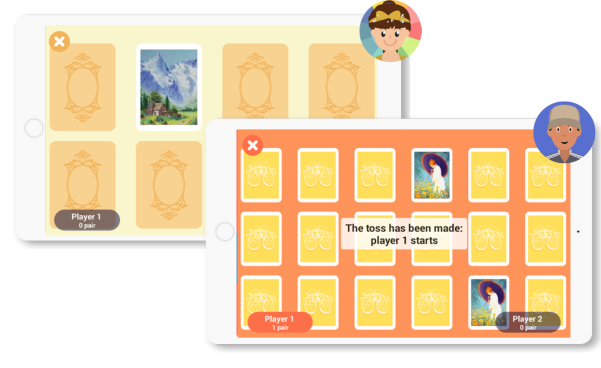
Furious cards
Memorize the order of the cards and reproduce the pattern.
This game is an excellent stimulus for visual memory, as it requires the player to memorize the order of the cards presented. By concentrating on the images displayed, the player exercises his or her ability to retain visual details and recall them later.
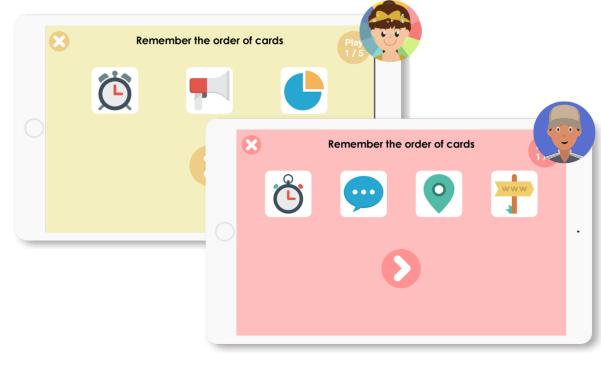
The game also offers an opportunity to stimulate semantic memory. By memorizing the names of the objects represented on the cards, players strengthen their ability to recall information associated with these objects. This involves not only the visual recognition of images, but also the association of images with their meaning, which calls on different aspects of memory and enriches the player’s cognitive experience.
Geography
Find the location of the country on the map or identify the name of the country displayed.
This game stimulates memory by drawing on general knowledge. In addition to stimulating memory, it encourages players to recall events related to these places, both personal and general. In this way, it encourages the enrichment of memories and knowledge associated with these places.

What’s more, the game offers an opportunity to create interesting topics of conversation to share with friends and family. By sharing personal experiences or cultural facts related to the different countries or places mentioned in the game, participants can enrich their social interactions while stimulating their memory and sharing their knowledge.
03.
GAMES FOR ATTENTION WITH SCARLETT AND CLINT
Explore games designed to stimulate attention in people with multiple sclerosis.

Twins

Furious cards

Geography
Attention
Attention disorders are also common in people with multiple sclerosis (MS). MS patients may have difficulty concentrating on a given task, or maintaining their attention over a prolonged period. This can be particularly troublesome when performing complex tasks or processing important information. Patients may also have difficulty moving quickly from one task to another, following conversations or following complex instructions. Treatments for MS attention disorders can include attention management strategies, concentration exercises and behavior modification techniques to help patients better manage cognitive symptoms. In addition, certain medications may be useful for improving concentration and attention in MS patients.
Sudoku
Complete the Sudoku grid.
Sudoku is an extremely important game for cognitive stimulation. It requires intense concentration and attention, as players juggle several elements simultaneously. Indeed, solving a Sudoku grid requires the ability to analyze the current configurations, anticipate the implications of each decision and keep an overview of the game’s progress.

The language
Language disorders are a common symptom in people with multiple sclerosis (MS). MS patients may have difficulty finding the right words, producing fluent and coherent language, understanding speech or following a conversation. These disorders can be troublesome in social and professional interactions, and can affect patients’ quality of life. Treatments for MS language disorders can include language therapies and exercises to help patients improve their verbal comprehension and expression. In some cases, medication may also be used to improve language symptoms.
Cognitive rehabilitation
Cognitive rehabilitation is an important intervention for people with multiple sclerosis (MS) who suffer from cognitive disorders such as memory, attention and language problems. This therapy is designed to help patients improve their cognitive abilities using stimulation and reinforcement exercises. Therapists can work with patients to develop compensatory strategies that help them manage cognitive deficits and improve their quality of life. Cognitive rehabilitation exercises can also include techniques to improve memory, concentration and planning. This therapy can be effective in helping patients maintain their independence and quality of life despite the cognitive deficits associated with MS. MS patients should discuss with their doctor the possibility of receiving cognitive rehabilitation for their cognitive problems. The results of cognitive rehabilitation may vary from patient to patient, but studies have shown significant improvements in cognitive function in MS patients.
Managing patients with multiple sclerosis (MS) often requires a team of qualified healthcare professionals to deal with the various aspects of the disease. Neurologists are often the main healthcare professional involved in MS management, but they may work in collaboration with other healthcare professionals such as occupational therapists, physiotherapists, speech therapists and psychologists. Occupational therapists can help patients improve their ability to perform activities of daily living, while physiotherapists can help improve muscle strength, balance and coordination. Speech therapists can help patients improve their language and communication, and psychologists can help manage the emotional aspects of the disease. Working together, these healthcare professionals can help MS patients improve their quality of life and manage their symptoms effectively. MS patients should consider working with a team of healthcare professionals to ensure they receive the appropriate care for their disease.
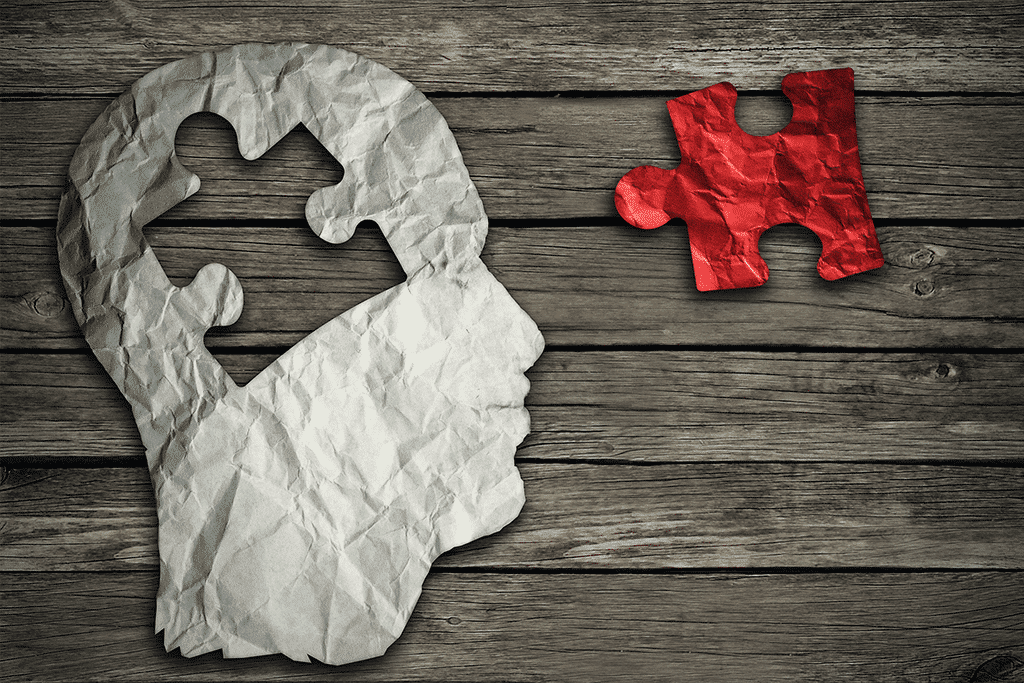
The benefits of cognitive rehabilitation
Cognitive rehabilitation can offer many benefits for people with multiple sclerosis (MS) who suffer from cognitive impairment. The therapy can help patients improve their memory, attention and language, which can improve their quality of life and ability to function independently. Cognitive rehabilitation exercises can also help patients develop compensatory strategies to manage cognitive deficits, and improve their ability to perform daily activities. Cognitive rehabilitation can also offer psychological benefits, helping patients to boost their self-esteem and reduce disease-related stress. Finally, cognitive rehabilitation can help patients maintain their employment or professional activity, which can be crucial to their financial and psychological well-being. Overall, cognitive rehabilitation can offer many benefits to MS patients suffering from cognitive impairment, and should be considered as an effective treatment for these symptoms.
Cognitive rehabilitation therapies have become an important approach to helping multiple sclerosis patients maintain their cognitive functioning. There are several types of cognitive rehabilitation therapies for multiple sclerosis, including exercise-based cognitive rehabilitation, occupational therapy and computer-assisted cognitive rehabilitation. Cognitive rehabilitation programs are designed to help patients improve their memory, attention, planning and problem-solving skills. The combination of these different therapies can be very useful in improving the quality of life of multiple sclerosis patients.
Exercise-based cognitive rehabilitation
Exercise-based cognitive rehabilitation is a therapeutic approach for multiple sclerosis that uses cognitive exercises to improve impaired brain function. This therapy aims to stimulate the brain through specific exercises such as memory games, puzzles and concentration exercises. These exercises can help patients improve their short-term memory, speed of information processing and ability to concentrate on a given task. Exercise sessions are tailored to each patient’s individual needs, maximizing the benefits of the therapy. Study results show that exercise-based cognitive rehabilitation can help multiple sclerosis patients improve their cognition and quality of life. What’s more, this approach is non-invasive, making it particularly attractive for patients seeking to avoid pharmacological treatments.
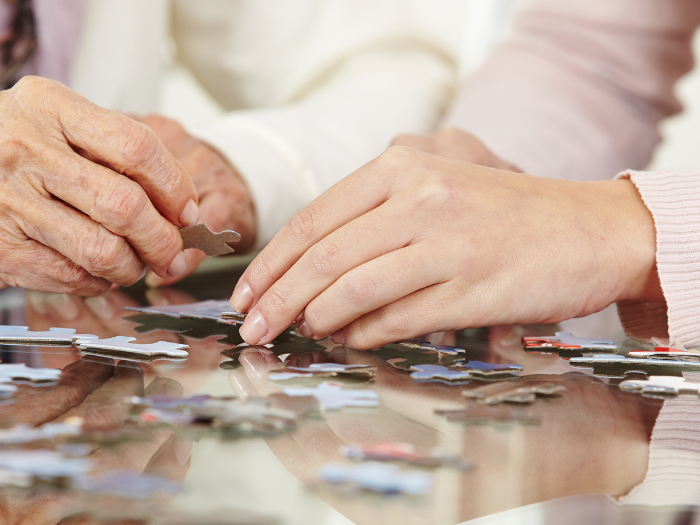
Occupational therapy
Occupational therapy is a therapeutic approach for multiple sclerosis that aims to help patients maintain their independence and autonomy in their daily activities. This therapy is based on the use of meaningful activities to help patients develop and improve their cognitive, physical and emotional abilities. Activities can include managing household chores, planning meals, participating in leisure activities and taking care of oneself. Occupational therapy is designed to help patients overcome the cognitive and physical challenges associated with multiple sclerosis, such as fatigue, muscle weakness and memory difficulties. Study results show that occupational therapy can help patients improve their quality of life, physical functioning and ability to engage in meaningful activities. In addition, this therapeutic approach can help patients maintain their independence and autonomy, which can have significant psychological benefits.
Computer-assisted cognitive rehabilitation
Multiple sclerosis is a chronic neurological disease that can affect cognition, memory and attention. Computer-assisted cognitive rehabilitation therapies have become a popular treatment option for people with multiple sclerosis. These interactive computer programs can help improve cognitive functions, particularly memory and concentration, using personalized exercises and mental stimulation tasks. Patients can work at their own pace, receive real-time feedback and monitor their progress over time. Computer-assisted cognitive rehabilitation is a non-invasive and effective method of improving the quality of life of people with multiple sclerosis.
The benefits of technology for people with multiple sclerosis
The use of technology in the management of multiple sclerosis can offer many benefits for patients. Firstly, telemedicine tools enable patients to communicate easily with their healthcare team, even at a distance. This can reduce the number of trips to the doctor and facilitate access to care for patients who live far from specialized care centers. In addition, computer-assisted cognitive rehabilitation can help patients improve their cognitive functions and quality of life. Symptom-tracking applications can also help patients monitor the progress of their disease, and quickly report any changes to their doctor. Finally, assistive technologies, such as mobility aids or voice assistance devices, can help patients remain independent and perform daily tasks more easily. Overall, the use of technology in the management of multiple sclerosis can improve patients’ quality of life and facilitate their access to healthcare.
Brain training programs
There are many ways to exercise your memory and cognitive functions.
The CLINT brain training program has been designed specifically for adults to keep the brain healthy through fun and stimulating brain exercises. It includes over 30 cognitive games and targets memory, concentration, language and planning. You can use the Clint app with your healthcare professional, or on your own between sessions.
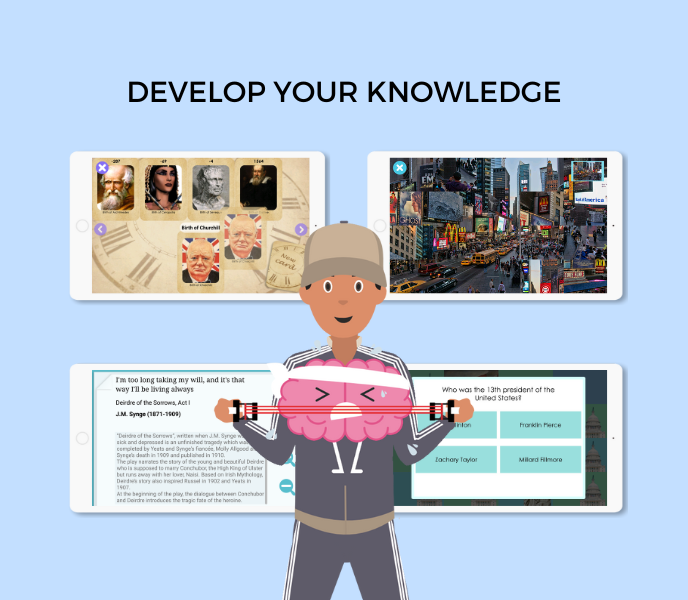
Discover the CLINT application, your brain coach
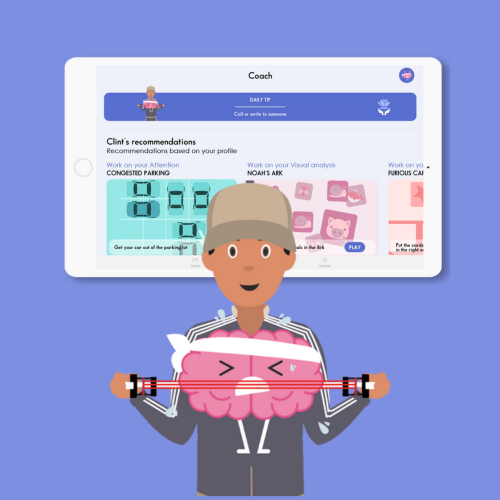
Discover the application The rolling ball to improve motor skills
